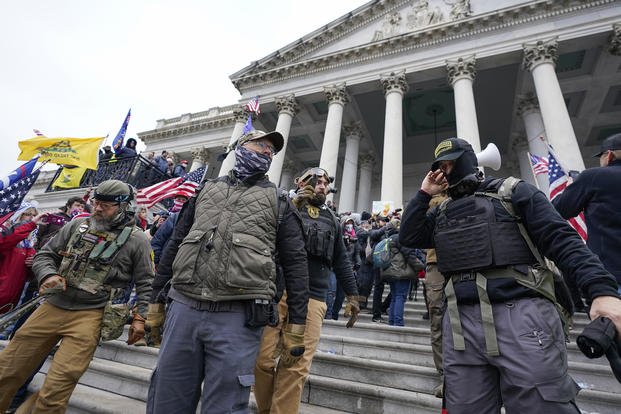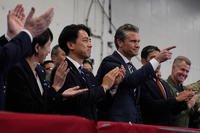The Pentagon still hasn't implemented a social media vetting process to identify extremists trying to join the ranks despite a high-profile push to root out the activity by Defense Secretary Lloyd Austin, according to a new think tank report released Tuesday.
Social media posts could provide the military with important indicators of who is participating in violent domestic extremism, the Center for a New American Security, based in Washington, D.C., said in the report. But the services do not have a uniform standard to apply to such screening, and the virtual world is beset with challenges such as confirming identities and sorting out pseudonyms.
Extremist activity has surged in the U.S., experts say, and groups such as the Oath Keepers and Proud Boys -- both had members charged with seditious conspiracy for the Jan. 6 attack on the U.S. Capitol -- often seek out service members and veterans with military experience. Extremist plots hatched by troops and veterans have included attacks on law enforcement and the power grid.
Read Next: The Army Keeps Booting COVID Vaccine Refusers as Shot Requirement May Be Dropped
The military has struggled to address the problem, saying the numbers of extremists in the ranks are relatively small. Austin ordered an extremism working group in the months after the Capitol attack that created some recommendations, as well as a department-wide stand-down.
"The challenge comes with the recruiter and unit-level commander," Katherine Kuzminski, the senior fellow and program director for military, veterans and society at the center, told Military.com. "What happens if someone has an anonymous account? How many searches on Google are they supposed to go through? Everyone says a like is not an endorsement, but what if they like a neo-Nazi page?"
In September, a paratrooper with the 82nd Airborne was arrested and booted from the military after an FBI probe found that his motivation for enlistment was to become proficient in killing Black people. Law enforcement found Spc. Killian Ryan's social media peppered with ties to white supremacy and other extremist groups. His email address was "Nazi Ace1488."
But that radical social media activity was not known to the military, and leadership at Fort Bragg, North Carolina, became aware of Ryan's extremist ties only after being contacted by federal authorities.
In 2021, 12 National Guardsmen were booted from the inauguration mission, mostly after an increased vetting process from law enforcement found troubling comments online or in text messages. However, the details were never released by the Guard.
But screening an applicant's or current service member's social media can be complicated for the military, and potentially opens the door for biased vetting or uncertainty, especially if online activity doesn't obviously call for violence or clearly indicate participation in radical causes.
Right now, the vetting process to join the military is generally a criminal background check. If an applicant has no convictions or outstanding legal issues, they often get the green light.
"The best metrics now for screening are tattoos," Kuzminski said, and she believes that isn't nearly good enough.
Meanwhile, the service-wide stand-down for leaders to brief their formations on extremism amounted to little more than a "check the block" event or was ignored altogether, some service members interviewed by Military.com said.
The Army, by far the largest service branch, so far has not implemented any notable changes to how it combats extremism and domestic terrorism in the force, or in how it screens applicants. None of the service's senior leadership has spoken publicly about the issue in any significant way.
Multiple service officials interviewed by Military.com have said tackling extremism is not a high priority because it isn't seen as a significant problem. Also, any efforts or public statements would be a political minefield that could stoke further criticism from Republicans on Capitol Hill and partisan media, which have painted extremism as a minor issue or an effort by Democrats and liberals.
Extremism among service members and veterans remains relatively low, but lone wolf-style attacks, such as the 1995 Oklahoma City bombing by Army veteran Timothy McVeigh and plots by small groups, can be highly dangerous.
Of the 896 people charged with crimes connected to the Jan. 6, 2021, attack on the Capitol, at least 128 are current or former members of the military. Oath Keeper leader Stewart Rhodes, who was convicted this month of seditious conspiracy for his role in the attack, preyed on those with military experience to build up the group and eventually carry out the plot, according to his trial records and those who know him.
"They are targeted by these groups, and that time after service can be vulnerable," Kuzminski said.
-- Steve Beynon can be reached at Steve.Beynon@military.com. Follow him on Twitter @StevenBeynon.
Related: Convicted Oath Keeper Leader Preyed on Veterans Looking for Meaning After Service














